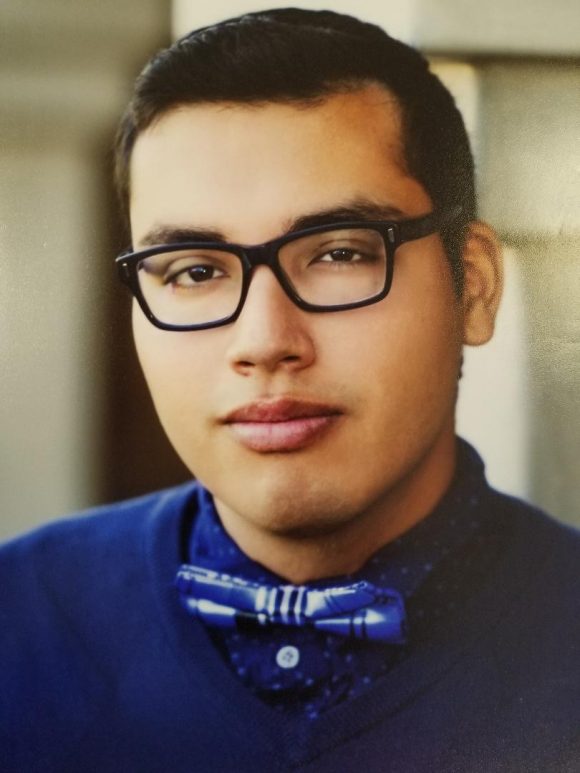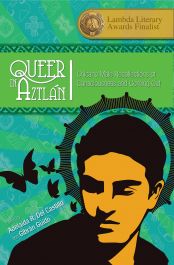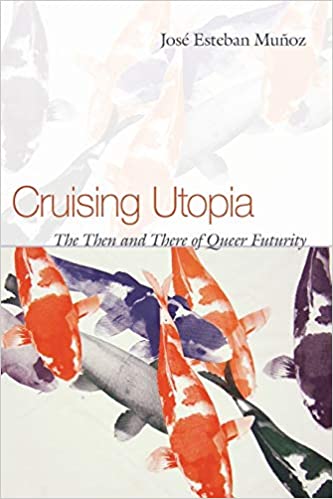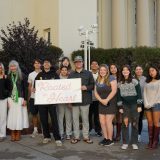Graduate Research: Aztlán Potentialities: Queer Male Chicanx Affect and Temporalities
September 7, 2021
 Ethan Trejo (he/him/his)
Ethan Trejo (he/him/his)
MA English ‘21
@jotoprof on Instagram
Originally from Downey, CA, Ethan received his BA in English and Political Science from Whittier College. His scholarship is focused primarily on the fields of Queer and Gender Studies and Latina/o/x Studies. His major interests lie in Queer Theory, Affect Theory, AIDS Literature, and Contemporary Queer and Latinx Literature.
This new Graduate Research feature of The Voice of Wilkinson highlights the nuanced and multi-faceted research of our graduate students. For our inaugural feature, recent grad Ethan Trejo discusses the research work that led to his thesis, and his advice for current and incoming graduates.
Voice of Wilkinson: What drove your initial interest in developing the research that would eventually lead to your thesis research?
Ethan Trejo: Well, I’m a queer Chicanx, so I knew that I wanted my thesis project to tackle that specific identity intersection. I was initially planning to investigate  the role that space plays in the queer Latinx identity: the queer nightclub, the Latinx home, etc.
the role that space plays in the queer Latinx identity: the queer nightclub, the Latinx home, etc.
As I was rereading Cherríe Moraga’s Queer Aztlán, I noticed that she was talking about Aztlán, the mythical/historical Chicanx homeland, as a queer setting. She writes that we, meaning queer Chicanxs, “seek a nation strong enough to embrace a full range of racial diversities, human sexualities, and expressions of gender.” To me, this need to “seek” out Aztlán for queer Chicanxs indicated that Queer Aztlán is something that we have yet to arrive at. This communal act of seeking out really resonated with me and became an idea that I needed to theorize further. Theorizing on this notion would eventually become the first chapter of my thesis.
VoW: What were some key takeaways from your research?
ET: This potential queer Aztlán exists as a queer futurity, a potentiality that we may yet arrive at.
If the original Aztlán supposedly generates a unified Chicanx identity while perpetuating a heteronormative, cisgender, patriarchal vision of the Chicanx identity, then queer Aztlán presents itself as a unifying futurity for queer Chicanxs under which the aforementioned systems of hegemony are queered.
Since this seeking of a queer Aztlán isn’t seeking out a physical place, this potentiality exists as an affect that drives our queer Chicanidad culture.
 By putting Moraga’s work in conversation with that of theorist José Esteban Muñoz, particularly his Cruising Utopia, we can theorize and explore how this affective potentiality can be used to understand the relationships between queerness and Chicanidad.
By putting Moraga’s work in conversation with that of theorist José Esteban Muñoz, particularly his Cruising Utopia, we can theorize and explore how this affective potentiality can be used to understand the relationships between queerness and Chicanidad.
Subsequently, we can then examine how this theory works in relation to pieces of queer Chicanx literature. I worked with Gil Cuadros’ City of God and Benjamin Alire Sáenz’s Aristotle and Dante Discover the Secrets of the Universe.
VoW: What most surprised you about your research, or the thesis writing process?
ET: I think I was most surprised by how much this work changed me. My research is incredibly personal and it clearly stemmed from a place of personal exigency. But at the same time, it also deeply impacted me, it gave me ways to think more clearly about the relationship between my own queerness and Chicanidad. In understanding this identity intersection in an effective capacity, I started thinking about what this could mean for Latinidad more broadly. It raised deeply personal questions for me, questions that will affect future research projects.
VoW: Tell us, personally and/or professionally, what have you been up to since finishing your degree? What are your plans post-graduation?
ET: I’ve been mostly preparing to teach in the fall and continuing with my current research projects. I’ll be teaching at Chapman, serving as a Lecturer in the English Department and teaching two sections of ENG 103: Seminar in Rhetoric and Composition. I also plan on applying for PhD programs for Fall 2022.
VoW: What has been your best experience at Chapman?
ET: Being a Graduate Student Instructor (GSI) was absolutely the best experience at Chapman. The freedom and trust that the department put in the GSIs really gave us the ability to make our classes personal. It also gave me the opportunity to further my passion for teaching and better understand how I can serve underrepresented students, particularly queer and Latinx students.
VoW: For our incoming students to the English program, what did you wish you had known starting your MA? What did you appreciate about the program? Is there a takeaway that still serves you in your day-to-day endeavors?
ET: I think that incoming students should really appreciate and take advantage of how open-ended the program is. Not only is the design of the program quite freeing, but the department also is incredibly supportive and helpful if you let them be. Seek out those opportunities, do an independent study, go to a conference, try to get a paper published. The Department of English will support you and help you as much as they can, but only if you voice an ambition and desire for what you want. Carry yourself with dedication and passion, both in and out of the classroom, and you’ll be rewarded with respect and support.

